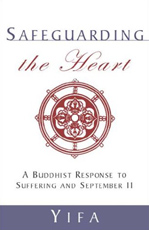Venerable Yifa has been a nun at Fo Guang Shan Monastery in Taiwan since 1979. She now lives in Cambridge, Massachusetts, where she serves as the director of the Greater Boston Chinese Cultural Center. In this well-presented paperback, she contends that the September 11 tragedy contains within it the lineaments of basic Buddhist principles on the omnipresence of suffering, the fact of impermanence, and the interconnection between all things. She believes it is important for us to focus our hearts and minds on what happened so that we will "be given the insight and wisdom that will help us gain equanimity."
Yifa offers a brief overview of Buddhist thought related to September 11 with sections on cause and effect, justice, faith, karma, war and peace, and compassion. She hits high stride with a presentation of ways to safeguard the heart from the toxins of anger, frustration, and fear. One of the saddest spinoffs of the terrorist attacks was the wildfire spread of feelings of paranoia, revenge, and hatred of Muslims. Most of those emotions grew out of people's anger.
Yifa discusses Buddhist practices that can safeguard of the heart in such situations. Meditation is one of them: "By watching our anger, for instance, we can actually help control it, simply by acknowledging that we are watching it." The process of stilling and examining the mind yields compassion and a realization of our interconnectedness with others.
In her conclusion, Yifa states: "September 11 was not the first tragedy to strike humanity and it will not be the last. It was not the gravest event and it was not the most inconsequential. Yet numbers and comparisons can never take away the individual loss that individuals suffered — and all of us who were in some way touched by what happened that day must honor that."
In a very poetic summary, she points out the many meanings of the event: "September 11 teaches us that life is very fragile and precious, that our time on this earth demands not resignation or forgetfulness but mindfulness and engagement. It teaches us that there is beauty even in the midst of horror, but only if we work for the good of all rather than the particular interests of the few. It asks us to commit to what seems impossible — a life dedicated to the helping of others who do not belong to our family but to the family of Man, and then beyond that to the families of all beings who live and die and live again on this small blue orb in the three layers of the thousand worlds."
